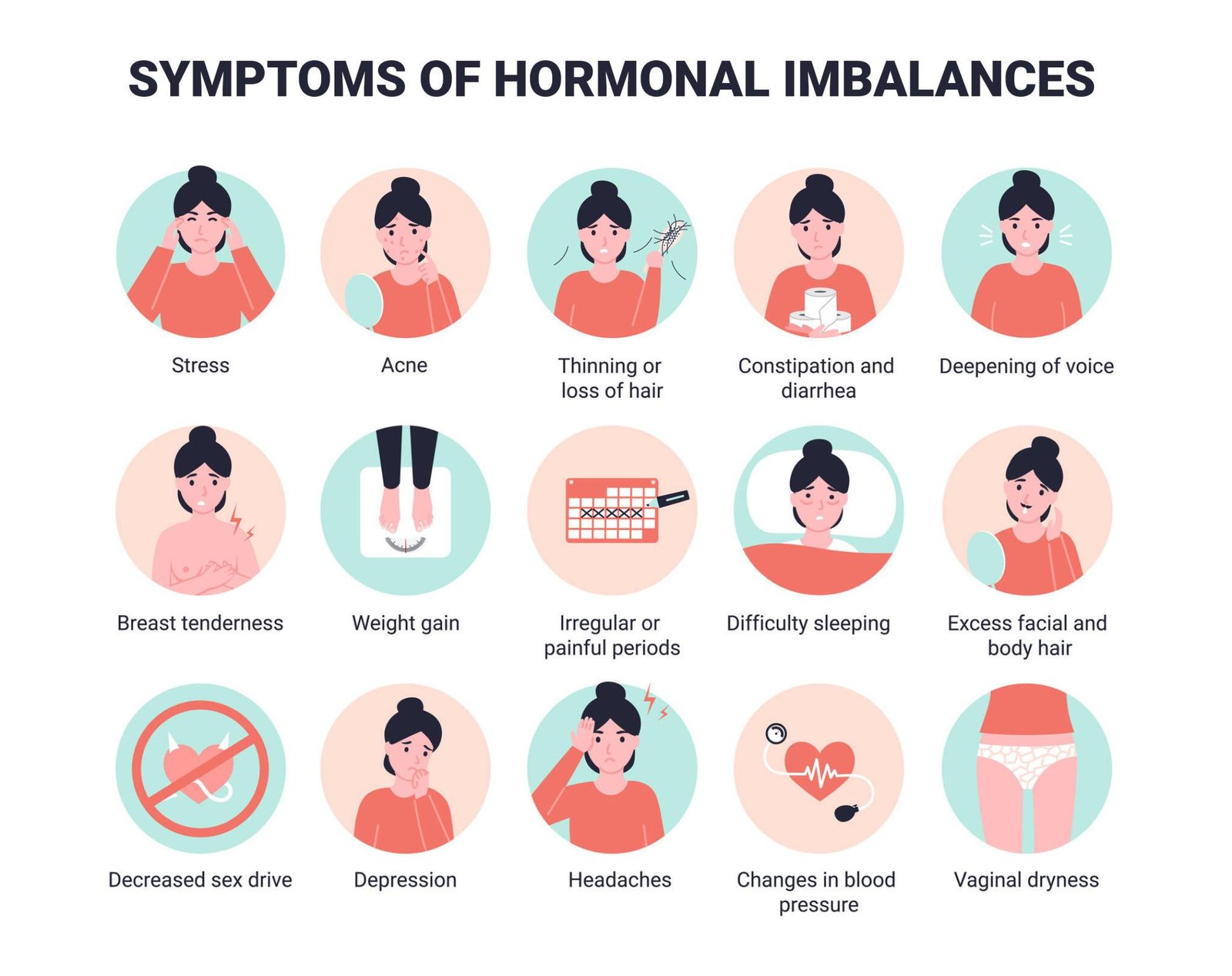Thyroid Troubles: The Connection Between Thyroid Health and Hormonal Imbalance in Women

In the intricate dance of hormones within the female body, the thyroid gland plays a pivotal role. Often referred to as the “master regulator,” the thyroid influences various physiological processes, and any imbalance can have profound effects on a woman’s overall well-being. This blog delves into the intricate connection between thyroid health and hormonal imbalance, shedding light on the complexities that women may face in maintaining a harmonious endocrine system.

Understanding the Thyroid’s Role:
The thyroid gland, a small butterfly-shaped organ located in the neck, produces hormones that regulate metabolism, energy levels, and body temperature. Two key hormones, thyroxine (T4) and triiodothyronine (T3), are released by the thyroid and play a crucial role in ensuring the proper functioning of cells and organs.
Thyroid Imbalance and Hormonal Disarray:
When the thyroid fails to produce an adequate amount of hormones, or conversely, produces them in excess, it can lead to hormonal imbalances. The two primary conditions associated with thyroid troubles are hypothyroidism (underactive thyroid) and hyperthyroidism (overactive thyroid).
Hypothyroidism:
In hypothyroidism, the thyroid gland does not produce enough hormones to meet the body’s needs. This condition can result in a myriad of symptoms, including fatigue, weight gain, cold intolerance, and irregular menstrual cycles. The hormonal imbalance caused by hypothyroidism can disrupt the intricate interplay of hormones responsible for regulating the menstrual cycle, affecting fertility and overall reproductive health in women.
Hyperthyroidism:
Conversely, hyperthyroidism occurs when the thyroid gland produces an excess of hormones. This can lead to symptoms such as weight loss, increased heart rate, anxiety, and irregular menstrual cycles. The elevated levels of thyroid hormones can interfere with the regular secretion of reproductive hormones, impacting menstrual regularity and fertility.
Impact on Menstrual Health:
The thyroid’s influence extends to the hypothalamus and pituitary gland, which together regulate the menstrual cycle. Any disruption in thyroid function can affect the release of gonadotropin-releasing hormone (GnRH), luteinizing hormone (LH), and follicle-stimulating hormone (FSH), crucial players in the menstrual cycle orchestra.
In hypothyroidism, the lack of thyroid hormones can lead to an increase in prolactin, a hormone that normally rises during pregnancy and lactation. Elevated prolactin levels can interfere with ovulation, causing irregular or absent menstrual cycles. On the other hand, hyperthyroidism can disrupt the delicate hormonal balance, resulting in irregular menstrual periods.
Fertility Challenges:
Thyroid troubles can pose significant challenges for women trying to conceive. Irregular menstrual cycles, anovulation (lack of ovulation), and altered hormonal levels can impact fertility. It’s crucial for women facing fertility issues to consider thyroid health as part of the comprehensive evaluation, as addressing thyroid imbalances may enhance fertility prospects.
Pregnancy and Thyroid Health:
Thyroid health is of paramount importance during pregnancy. Hormonal fluctuations and increased metabolic demands can strain the thyroid, leading to gestational thyroid disorders. Untreated thyroid issues during pregnancy are associated with adverse outcomes, including preterm birth, low birth weight, and developmental issues. Regular monitoring of thyroid function is essential for expectant mothers to ensure a healthy pregnancy and optimal fetal development.
Lifestyle Factors and Thyroid Health:
Several lifestyle factors can influence thyroid health and contribute to hormonal imbalances. Stress, inadequate nutrition, and environmental toxins can adversely affect the thyroid gland. Adopting a healthy lifestyle, managing stress, and ensuring adequate intake of essential nutrients like iodine and selenium are crucial steps in supporting thyroid function and maintaining hormonal harmony.
Diagnosis and Treatment:
Diagnosing thyroid troubles involves blood tests measuring thyroid hormone levels (T3, T4) and thyroid-stimulating hormone (TSH). Once diagnosed, treatment options depend on the specific thyroid disorder. Hypothyroidism is typically managed with synthetic thyroid hormones, while hyperthyroidism may involve medications, radioactive iodine therapy, or, in severe cases, thyroid surgery.
Lifestyle Strategies for Thyroid Health:
- Nutrition: Ensure a balanced diet rich in iodine, selenium, zinc, and vitamins crucial for thyroid function.
- Stress Management: Adopt stress-reducing practices such as meditation, yoga, or mindfulness to support overall hormonal balance.
- Regular Exercise: Engage in regular physical activity to promote metabolism and maintain a healthy weight.
- Regular Check-ups: Routine monitoring of thyroid function is essential, especially for women with a family history of thyroid disorders or those planning pregnancy.
Conclusion:
In the intricate web of women’s hormonal health, the thyroid gland stands as a crucial player. Its influence extends beyond metabolism to impact menstrual regularity, fertility, and overall well-being. Recognizing the signs of thyroid troubles and understanding the connection between thyroid health and hormonal balance empowers women to take proactive steps in maintaining a harmonious endocrine system. By fostering awareness and prioritizing thyroid health, women can navigate the complexities of hormonal balance and embrace a path to overall wellness.
